(Tip: To open the tweet in a new window 'Right-Click' the 'Tweet This Story' text and 'Open link in new tab')
Wiper using wireless collars to stop elephant poaching in Africa
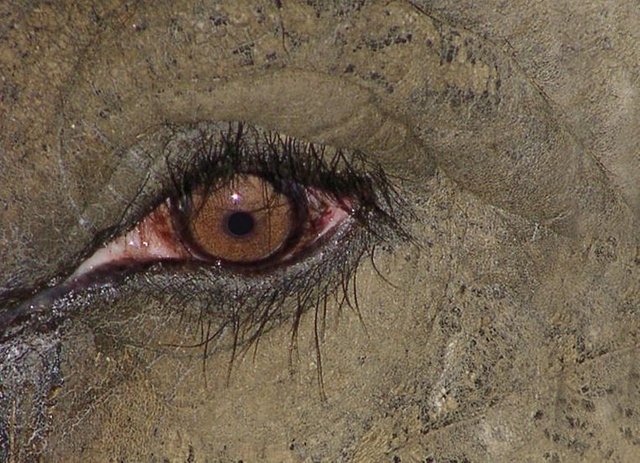
A team of entrepreneurs in the United States have combined their expertise to combat elephant poaching in Africa, creating Wiper, a wireless anti-poaching device that uses GPS tracking and gunshot detection technology to automatically send the location of poaching events to authorities in real-time.
Wiper co-founders Akos Ledeczi from Vanderbilt University and George Wittemyer from Colorado State University told ZDNet they are hoping to thwart poaching at its source using an animal-mounted ballistic shockwave detector.
Wiper uses a low-power acoustic shot detector integrated with a GPS tracking collar to detect the shockwave generated by the supersonic bullet -- a technique used by the military to locate snipers -- so that the collar can recognise a gunshot even if the poacher muffles the shot.
The collar can detect gunshots within a 50-metre radius which means, unlike other trackers such as heart-rate monitors for individual animals, not all animals need to be collared.
Full story at http://zd.net/2rWKo35
Source: ZDNet
Hong Kong launches bill to ban domestic ivory trade
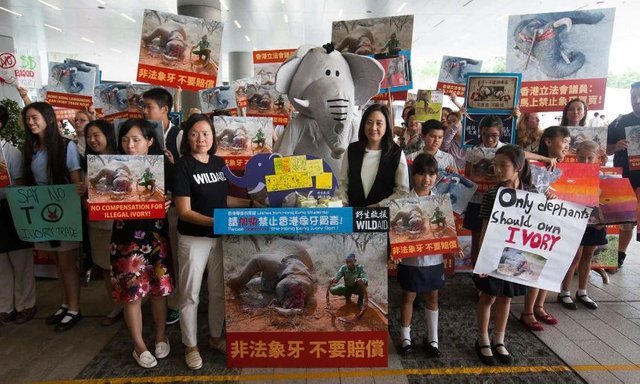
Hong Kong has launched a landmark bill to ban its domestic ivory trade, amid accusations that authorities were lagging behind China in phasing out the market.
Hong Kong is home to the world’s biggest retail ivory market, with more items for sale than anywhere else in the world. The majority of buyers are mainland Chinese, who smuggle the worked ivory across the border. Hong Kong is also perpetuating the illegal market: more than a third of licensed ivory dealers have been found to advise buyers on ways to smuggle ivory out of the city, according to a recent report by Traffic.
The bill would ban the import and export of worked and raw ivory by 2021, including banning the possession and sale of all ivory obtained before 1990.
The move follows the ban of mainland China’s domestic ivory trade, seen by many as a critical step in the global battle against poaching. Asian demand for ivory is widely believed to be behind the sharp rise in elephant poaching over the last decade. Ivory factories in mainland China were officially shut down by 31 March 2017, and the rest of the retail outlets will close by the end of the year.
Full story at http://bit.ly/2rWujut
Source: The Guardian
Anti-poaching drive brings Siberia’s tigers back from brink
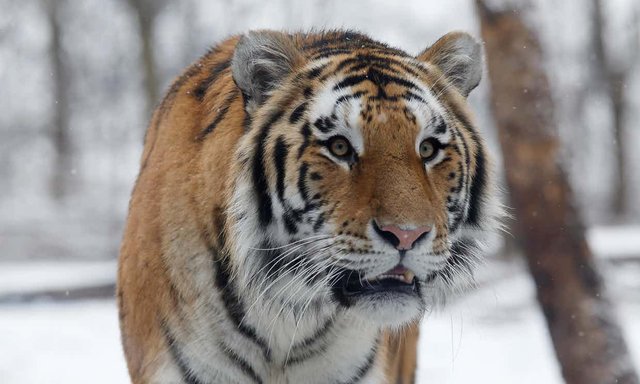
In February, Pavel Fomenko was told that the body of a young female tiger had been discovered underneath a car parked outside the town of Luchegorsk, in eastern Russia. Fomenko – head of rare species conservation for WWF Russia – took the corpse for examination where he uncovered the grim details of the animal’s death.
The Amur tiger, which is also known as the Siberian tiger, had been caught in a trap and had chewed off a paw to free itself. It was left crippled, unable to hunt, and died of starvation while seeking shelter under the car. “Hearing about this sort of thing is always painful,” said Fomenko. “This was a beautiful tigress.” It is harrowing scenes such as these that conservation groups are hoping will become increasingly rare in the years to come. Later this week, WWF will launch an appeal that aims not just to halt the decline in tiger numbers but to boost them to new levels. The goal is to increase the world’s tiger population in the wild to more than 6,000 by 2022, the next Chinese year of the tiger. In this way, it should be possible to achieve global security for this poster boy and girl of the conservation movement.
The death of the tigress found under the car is tempered by the knowledge that the Amur is part of a global wild tiger population that has started to rise, albeit marginally, after decades of decline. The world lost 97% of its tiger population in a little over a century, but last year, WWF reported that global numbers in the wild had risen from 3,200 in 2010 to about 3,900 in 2016, thanks to the introduction of anti-poaching patrols, habitat protection and other measures.
“The increase in tiger numbers is encouraging but the species’ future in its natural environment still hangs in the balance and numbers remain perilously low,” said Rebecca May, WWF’s tiger specialist. “There now needs to be an enormous push forward to build on this progress. We need commitment and urgent action from all governments of ‘tiger-range’ countries [where tigers still roam free], as well as the passion and unwavering support of the public.”
Full story at http://bit.ly/2rX0PN1
Source: The Guardian
Hong Kong shark art protests at fin trade
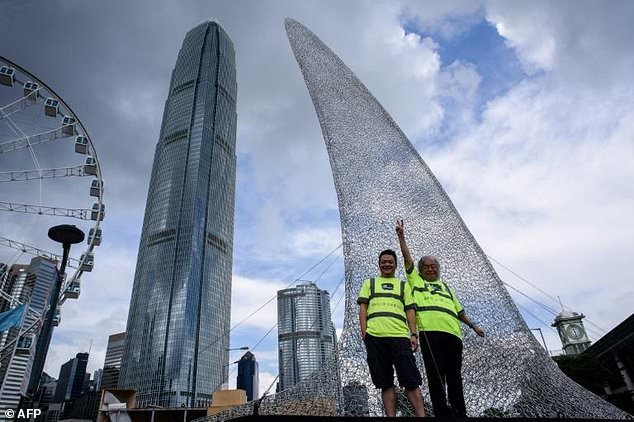
A towering shark fin sculpture is the latest addition to Hong Kong's harbourfront as part of an artistic push against the infamous trade.
Hong Kong is one of the world's biggest markets for shark fin, which is viewed by many Asians as a delicacy and is often served as a soup at expensive Chinese banquets.
The eight-metre-high (26 ft) stainless steel fin was created by Chinese artist Zheng Lu as part of an exhibition to highlight the threat to shark populations from human hunting.
Hosted at the Maritime Museum in central Hong Kong, it is a stone's throw from the neighbourhood of Sheung Wan, where dried seafood stores sell the fins.
Full story at http://dailym.ai/2trFa3i
Source: Daily Mail
The Latest: Endangered Hawaiian monk seal born in Waikiki
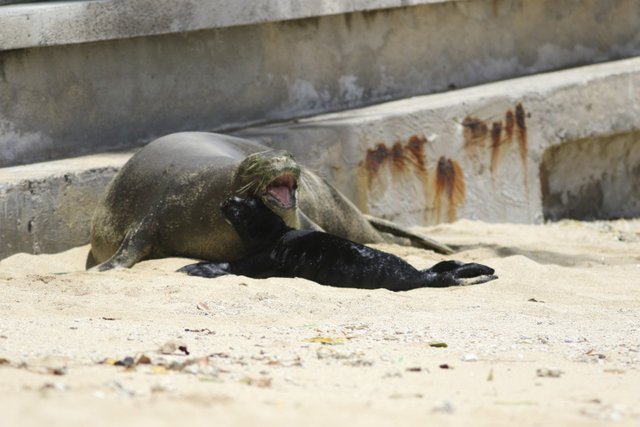
An endangered Hawaiian monk seal has given birth on a Waikiki beach.
Hawaiian Monk Seal Recovery Program coordinator Angela Amlin says the seal was born late Wednesday or early Thursday.
It’s the first seal to be born in the densely populated tourist district since the National Oceanic and Atmospheric Administration began keeping track in the 1970s.
Mother and pup attracted dozens of onlookers as they rolled around on the sand. Volunteers kept people at a safe distance behind a rope barrier.
Full story at http://wapo.st/2trK6FD
Source: Washington Post
What Nemley Jr's death means for fight to protect chimps
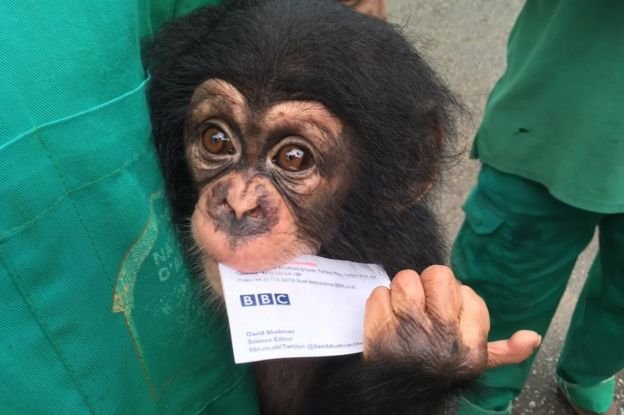
The death of the baby chimpanzee Nemley Jr, rescued from wildlife traffickers only to fade away in a zoo in Ivory Coast, has provoked outrage.
And after a BBC investigation that lasted more than a year, those of us involved in the work are finding his loss upsetting and also incredibly frustrating.
In the wild, infant chimps have a poor survival record. And youngsters rescued from traffickers have endured the trauma of losing their mothers and then being thrust into the unfamiliar world of humans, so many of them do not make it either.
In his last few weeks, Nemley Jr was given intensive care and dedicated support, so who or what is to blame for his shocking demise, and how best to save endangered animals such as chimpanzees from extinction?
Full story at http://bbc.in/2trLx6F
Source: BBC News
Prepared by @SydesJokes
Original post from: http://Blog.CrowdifyClub.com/
Hi there ✌🏻 I'm Vikky and I'm a new steemer! I'm not flooding, just sharing the funny stories with photos about my golden retriever puppy Mr. Oliver 🐶🐶🐶 Please follow me back and vote for my first posts) I'm really thankfull to you 😻
Downvoting a post can decrease pending rewards and make it less visible. Common reasons:
Submit
Hi! I am a robot. I just upvoted you! I found similar content that readers might be interested in:
https://www.theguardian.com/environment/2017/jun/24/siberia-tigers-conservation-poachers-extinction
Downvoting a post can decrease pending rewards and make it less visible. Common reasons:
Submit
Congratulations @sydesjokes! You have completed some achievement on Steemit and have been rewarded with new badge(s) :
Click on any badge to view your own Board of Honnor on SteemitBoard.
For more information about SteemitBoard, click here
If you no longer want to receive notifications, reply to this comment with the word
STOPBy upvoting this notification, you can help all Steemit users. Learn how here!
Downvoting a post can decrease pending rewards and make it less visible. Common reasons:
Submit